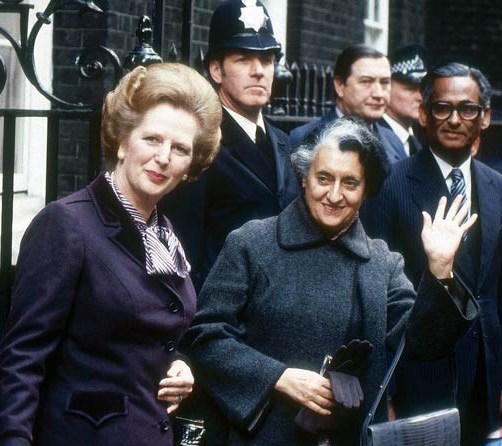What Kapil’s devils didn’t see- THE MESSAGE TO INDIRA THAT MAGGIE SPIKED | |
| AMIT ROY January 17, 2014 | |
London, Jan. 16: The National Archives in Kew, west London, is an extraordinary place with millions of records but it is fair to say its hottest file currently is “PREM 19/1273” covering UK-India relations. The file contains the letters about India seeking British advice on Operation Bluestar, now a matter of investigation here. But the file also has nuggets that show Prime Minister Margaret Thatcher had refused to send a telegram congratulating Indira Gandhi on the Indian cricket team’s triumph in winning the World Cup at Lord’s on June 25, 1983. She scribbled a curt “No” on the foreign office document which had suggested that she should recognise the achievements of Kapil Dev and his team. The following sequence of events is put together from the PREM (titled so probably to denote the Prime Minister) file.
Note from J.E. Holmes, private secretary to the foreign secretary, to John Coles, private secretary at No. 10 Downing Street, on June 27, 1983: “The Indian cricket team’s success last Saturday in the final of the Prudential World Cup competition is being celebrated as a major event throughout India. A message of congratulation from the Prime Minister to Mrs Gandhi would give great pleasure to the latter and would also be seen as a compliment to India. A draft message in the form of a telegram to Delhi is enclosed.” But Coles, showing remarkable chutzpah that not many civil servants are known to display these days, advises Thatcher to reject the idea: “I think this is a bit much. Do you want to send it?” A one-word reaction was jotted down and underlined by Thatcher: “No.” Coles replies formally to Holmes (who might have been a cricket fan) on June 28, 1983: “The Prime Minister feels that it would not be appropriate for her to send a message of congratulation to Mrs Gandhi about the Indian cricket team’s success in the Prudential World Cup competition.” This is the telegram that was drafted by Holmes but never got sent: “Congratulations on the Indian cricket team’s splendid success in the World Cup series. This was an outstanding performance. The sportsmanship and skill shown by Kapil Dev and his team were a delight to all lovers of cricket.” PREM 19/1273, which is quite a fat file, covers comings and goings at 10 Downing Street in 1983. Unfortunately, it stops at the end of February 1984, so that events leading up to Bluestar from June 3-8, 1984, and its aftermath will not be released until next year. Given the controversy caused by what has appeared, it is pretty much certain that any document to do with Bluestar will be “retained” in the vaults. Already, there is recognition that it was an error to release the notes on the operation. Wishing for greater transparency, Britain is moving from a 30-year to a 20-year rule but individual departments have the right not to release documents considered especially “sensitive”. In the days before email, Britain kept a careful note of the conduct of government. PREM 19/1273 deals in detail with matters of trade, including the now-cancelled proposal to sell Westland helicopters to India. Some gems follow. Prickly Indira The British considered Indira Gandhi a prickly character, who needed careful handling, as indicated in this foreign office brief to No. 10: “Indo-British relations are in good shape, despite fundamental differences on many international issues. There is a personal rapport between Mrs Gandhi and Mrs Thatcher…. Mrs Gandhi’s attitude is crucial. She is quick to take offence at slights, real or imagined. A continuing effort to convince her and her Government of the importance we attach to our relationship with India is necessary and has resulted in a steady flow of high level visits on both sides, including most recently, the visit of The Queen and the Duke of Edinburgh for 10 days in November 1983 when The Queen opened the Commonwealth Heads of Government meeting.” Another foreign office note: “Mrs Gandhi rules in a highly autocratic and personalised manner, relying on a small group of advisers including her one surviving son, Rajiv.” Paul’s power From Peter Ricketts, private secretary to the foreign secretary, to Coles, private secretary at 10 Downing Street on January 19, 1984: “Dr (Seyid) Muhammad has been High Commissioner since September 1980. He will depart on 12 February. Although Dr Muhammad’s contribution to the development of India-British relations has been limited (and somewhat overshadowed by the private efforts of Mr Swraj Paul), relations with India during his time in London have been excellent.” The assessment reflects a joke that had done the rounds then: Paul was the “higher commissioner”. |
↧
Prickly Indira, curt Margaret -- Amit Roy
↧

